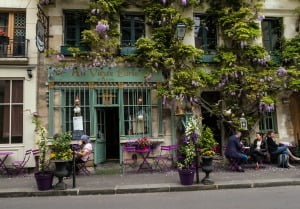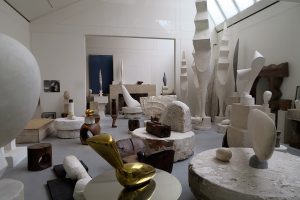One cloudy spring afternoon, after crossing the mud-green Seine from Ile de la Cite to the Latin Quarter, my spouse and I stumbled upon a small bookstore at 37 Rue Bucherie. Two foot-high bollards dotted the sidewalk next to the street. Large pink blossoms decorated the Paulownia tree in front of the store. The facade and wooden shutters were painted a very British viridian green and above the windows of the first floor, the words Shakespeare and Company, in all caps.

This bohemian shrine to English literature had a reputation as large as the store was small. In a refreshing antithesis to the big box bookstore, limited floor space meant that every stuffed shelf had been carefully curated. An anachronism in the era of the paperless book, this living museum contained at least one book by every Beat author, and not content to remain in the past, Shakespeare & Company now featured podcasts on its website by the most fearless contemporary writers.
On the sidewalk in front of the store, a small crowd stood in the evening rain. They were the unlucky ones who had not secured a seat indoors for the evening’s reading – a celebration of the bard’s birthday. Next to us, under their umbrellas, a tall American and a portly Brit were one-upping one another with their knowledge both of the French language and Shakespeare. When we heard that professional actors were going to read selections from Shakespeare, we quickly abandoned our dinner plans.
After we listened to the Bard’s brilliantly performed works over the outdoor speakers, we resolved to attend next week’s reading, but seated indoors. There are approximately 50 seats for the readings which cannot be reserved – it’s first come, first served.
The following Tuesday we ate a vegetarian meal at the cozy Shakespeare Cafe, all blond wood and raw stone walls, while next to us, two MFA students from Sarah Lawrence discussed their creative writing class. Then we headed next door to hear three young Irish writers newly published in Granta. A twenty-something host welcomed us in English and like every accomplished ringmaster, began to weave his spell. “Paris has a long history of welcoming Irish writers” he said, “And we’re delighted to continue that tradition with tonight’s authors.”
Sara Baume last visited Shakespeare and Company as a nerdy teenager and was thrilled to return as an author. She read her first paragraph in halting French, then stopped and reread it in her soft Irish brogue. We quickly entered the world of her short story about two cousins, young women called Dark and Fair, at a drunken Irish wedding. Authors Lucy Caldwell and Sally Rooney followed with equally accomplished stories and I wondered, are there really any bad Irish writers?
After the Q&A we remained in our precious hard, wooden chairs, holding plastic cups. A volunteer filled our glasses to the brim with a French bistro red and we both said in unison, “this would never happen at home.” We vowed to return the following week.

Browsing the store on our next visit, I discovered several aphorisms from my college days in the early 1970s. Above the entrance to the reading library I read, “Be not inhospitable to strangers, lest they be angels in disguise.” On worn red steps leading to the third floor, painted in one to four word phrases on 9 individual risers, were the words of Sufi poet Hafiz, “I wish I could show you when you are lonely or in darkness the astonishing light of your own being.” These inspirational affirmations, totally out of place in Barnes & Noble, added immeasurable charm to the time capsule that is Shakespeare & Company.
After a month of readings, Frederic Lenoir was our last author at Shakespeare & Company. His latest book was a European best-seller titled “Happiness: A Philosopher’s Guide.” He was the first French author we encountered at Shakespeare & Company, and he wasn’t a novelist, but a philosopher, writing in a genre more commonly the purview of charlatans.
“We never shy away from the big questions here at Shakespeare and Company,” the host began, “and tonight we are going for the jugular of one of the biggest, happiness.” People squeezed into impossible spaces and the crowd at the back leaned shoulder to shoulder.
“Thank you for coming, said Frederic Lenoir, a boyish looking man with neat gray stubble, “ it is a big joy for me and also a deep suffering. The big joy is because I love this place, I know this place since a long time, and suffering because my English is very poor, so please be patient with me.” When the host asked Lenoir about his motive for writing the book he responded, “It was my first aim to show all those debates, the way happiness has been thought about throughout history.”
In his research Lenoir discovered that scientists and philosophers, taking different paths to a similar conclusion, found that people are happiest when they live in the present. That we really can be happier is the premise of his book – if we think better, we can live better. “Happiness is a state of being, a way of watching life,” he said.
He cited a parable to illustrate, “A young man entering an unknown city asked the old man at the gate, ‘How are the people here?’ The old man replied, ‘How are the people where you are from?’ ‘Terrible,’ said the young man. ‘They are terrible here too,’ replied the old man.” The rapt audience laughed. Lenoir continued “Another young man walked to the gate of the same city and encountered the same old man. How are the people in this town? he asked. How are the people in your town? he replied. The young man said, they are wonderful, considerate people, the best in the world. The old man replied, They are the same here.”
Travel has that remarkable ability to keep one in the present and the audience felt very much in the present that night at Shakespeare & Company. After our month of readings, we felt less like tourists and more like active participants in the literary life of Paris. What the readings gave us, beside glimpses of new authors, was a sense of community, of being part of the regular activities of English-speaking Parisians. No longer a minority of two, we had found our people and they were at Shakespeare and Company every Tuesday evening.



Someone has definitely been studying travel writing. This is an excellent article about one of the most wonderful spots in Paris.
Thanks and thanks to an excellent editor with thoughtful suggestions.